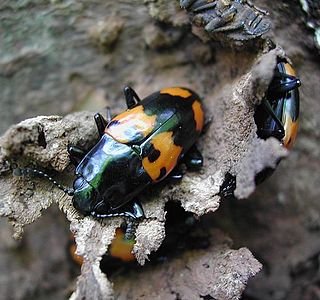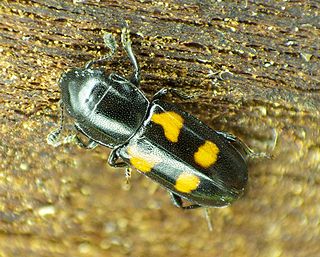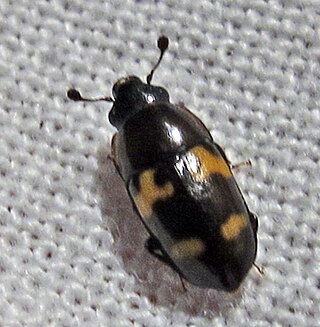
Megalodacne is a genus of fungivorous beetles in the family Erotylidae.

Glischrochilus[note 1] is a genus of sap-feeding and predatory beetles under the family Nitidulidae, subfamily Cryptarchinae. Most members of this genus are commonly known as picnic beetles or beer bugs.

iNaturalist is an American 501(c)(3) nonprofit social network of naturalists, citizen scientists, and biologists built on the concept of mapping and sharing observations of biodiversity across the globe. iNaturalist may be accessed via its website or from its mobile applications. iNaturalist includes an automated species identification tool, and users further assist each other in identifying organisms from photographs. As of 24 February 2024, iNaturalist users had contributed approximately 172,751,520 observations of plants, animals, fungi, and other organisms worldwide, and around 350,000 users were active in the previous 30 days.

Glischrochilus quadripunctatus, commonly known as the European bark beetle predator is a species of beetle in the genus Glischrochilus of the family Nitidulidae.

Glischrochilus quadrisignatus, known generally as four-spotted sap beetle, is a species of sap-feeding beetle in the family Nitidulidae. Other common names include the beer bug and picnic beetle. It is found in North America.

Trechus obtusus is a species of ground beetle in the family Carabidae. It is found in North America, Europe, and Africa.

Pityogenes is a genus of typical bark beetles in the family Curculionidae. There are more than 30 described species in Pityogenes.
Curculio obtusus, the hazelnut weevil, is a species of true weevil in the beetle family Curculionidae. It is found in North America.
Glischrochilus sanguinolentus is a species of sap-feeding beetle in the family Nitidulidae. It is found in North America.
Glischrochilus vittatus is a species of sap-feeding beetle in the family Nitidulidae. It is found in North America.
Glischrochilus confluentus is a species of sap-feeding beetle in the family Nitidulidae. It is found in North America.

Glischrochilus fasciatus, the picnic beetle, is a species of sap-feeding beetle in the family Nitidulidae. It is found in Central America and North America.
Agrilus obtusus is a species of metallic wood-boring beetle in the family Buprestidae. It is found in Central America and North America.
Glischrochilus siepmanni is a species of sap-feeding beetle in the family Nitidulidae. It is found in North America.
Animal Ethics is a nonprofit organization formed to promote discussion and debate around issues in animal ethics and to provide information and resources for animal advocates. They also do outreach work in several countries on the issue of speciesism. Their aim is to create a world where moral consideration is extended to all sentient beings. The organization's website covers topics such as speciesism, sentience, veganism and wild animal suffering and has content translated into several languages.






